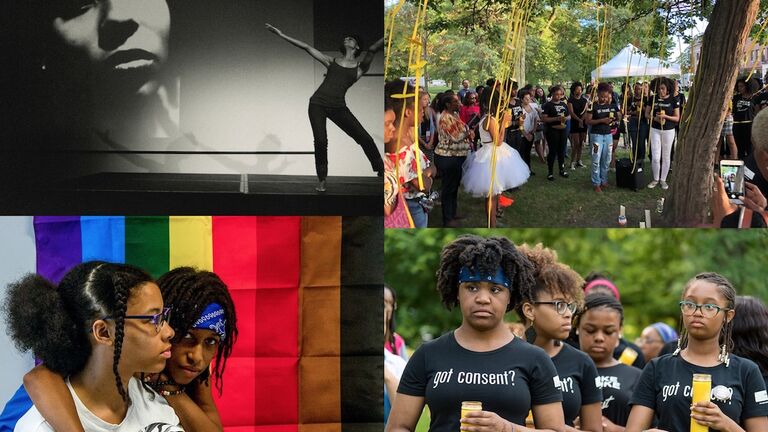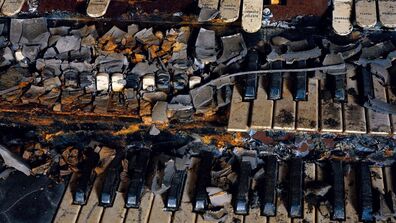
Healing at the Heart of A Long Walk Home
The Tillet Sisters have long been on the front lines investing in young Black communities. In 2003, Salamishah and Scheherazade Tillet (MA 2005) founded A Long Walk Home (ALWH), a nonprofit organization to empower Black girls with art and activism to change the narrative on sexual violence, gender discrimination, and criminal injustice. ALWH leads several initiatives and events that educate the community on the importance of healing and reclaiming public spaces such as Story of a Rape Survivor (SOARS), #SayHerName: The Rekia Boyd Memorial Project, and The Girl/Friends Leadership Institute.
“We start off with ourselves first,” Scheherazade explained in a recent interview with SAIC. “That’s what a Black Feminist project is — giving ourselves our own tools to be enough to then help others. And those two things go back and forth; the community care and the self care are kind of fluid at times. The community helps you, but also you have to have the tools to help the community.”
SOARS was born from a need to reclaim space and power. While they were in college, Salamishah confided to her sister that she had been raped, and as an artist, Scheherazade wanted to help and honor her sister. She began to photograph Salamishah’s healing process as a piece of social documentary, and later — Salamishah's first year of graduate school at Harvard and Scheherazade's senior undergraduate year at Tufts — the project evolved into a performance of song, dance, photography, and poetry stemming from Salamishah’s journals.
The story of Salamishah’s inward healing transformed into a movement that surpassed either of the Tillet sisters’ expectations. From their first sold-out show in 1999, the idea for survivors of sexual assault to reclaim their own spaces tapped into a larger need for community healing, especially in light of a 2017 study from the Institute for Women’s Policy Research showing that more than 40% of Black women experience physical violence from an intimate partner and more than 20% are raped. And for the 20th anniversary of SOARS' first performance, ALWH presented a town hall for Black girls, which––in addition to their performance––spoke on the importance for visibility and safety for Black and Brown girls.
#SayHerName: The Rekia Boyd Memorial Project is an ongoing fight to have a memorial placed in the recently renamed Douglass Park in memory of Rekia Boyd. On March 21, 2012, Rekia Boyd was walking with a group of friends in Douglass Park near her home, when an off-duty police officer confronted the group from his car. Dante Servin shot at the group five times when one of the group approached holding a cell phone — Servin claims it was a gun; none was ever recovered — shooting Rekia Boyd in the back of the head. Servin was never charged for Boyd’s death, being acquitted on a legal technicality, and still lives across the street from Douglass Park.
For the past several years, ALWH has been actively involved in reclaiming Douglass Park as a space for healing for Boyd’s family and the community. They host annual marches and events, including Black Girl Takeover: Douglas Park where Girl/Friends and ALWH activists hung yellow streamers on a designated “Healing Tree” in honor of Rekia Boyd, listened to a live concert from Jamila Woods, played double dutch, held an outdoor photoshoot, and wore black t-shirts emblazoned with white lettering “Got Consent?”. In the matter of police brutality, when Black women’s stories are often lost in the public narrative, the importance of daring to express Black girlhood in spaces where they are subdued is not lost., “Art becomes another form of justice," Scheherazade says, "as we’re seeing now with street murals and the Black Lives Matter movement. I know with during this work with sexual assault for so long that, oftentimes, you can’t look at the criminal justice system to find justice — Art becomes the form.”
The Girl/Friends Leadership Institute is a five-week summer program through SAIC for Black girls in Chicago that introduces students to various forms of art and activism -- participating in marches in Minnesota and New York, for example, or tours through the Art Institute of Chicago. In a Chicago Reader article last year, Salamishah said, “We’ve seen it with African American girls in Chicago, you don’t just transform the life of an individual girl. You transform the lives of her parents, her family, her school, her community, and from there the city, and from there the nation.”
With the pandemic, the impact on young people and their families has been particularly prominent -- some of the older girls in their program work at nursing homes and help provide for their whole family -- but ALWH is doing their best to ease the burden. ALWH virtually meets with their girls regularly, offering critical social and emotional support. To combat financial struggles, ALWH also created an emergency grant and gave around $20,000 in stipends, as well as access to other resources — mailing art supplies and cameras from ALWH’s personal stock — to give the girls agency to do whatever they need to do with these resources.
Scheherazade can’t help but share her pride for the girls’ responses, though, as supporting community healing and justice has still been at the forefront.“85% of the young people that we worked with engaged in some type of activity during this uprising moment,” Scheherazade raves, “We define it as, whether it’s helping a friend who is suicidal to actually protesting downtown for George Floyd and Breonna Taylor to going to marches for immigrant children who are detained by ICE. We have one young girl who transformed a liquor store into a food mart in Austin [Chicago neighborhood] to address the food deserts.”
For the Black women and girls who have been touched by A Long Walk Home (ALWH), they know that healing is a survivor of rape reclaiming her spirituality and body through a multimedia performance. Healing is a poem spoken at a local park where a young Black woman was murdered by a police officer. Healing is wearing black t-shirts emboldened and emblazoned at protests and marches. Healing begins inward and branches outward, into a community of communities.
In short, healing is radically and irrevocably connected to social justice.
